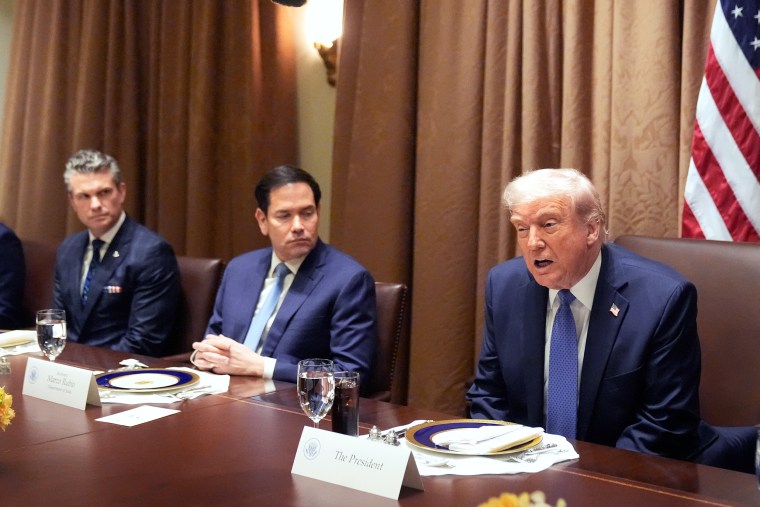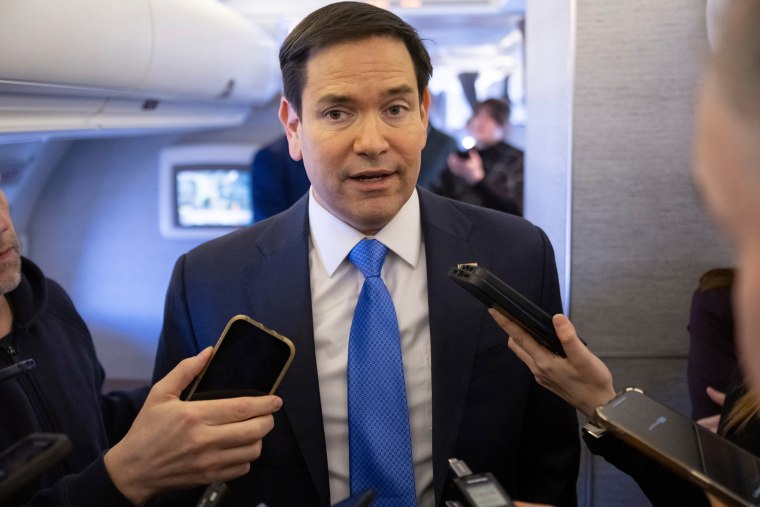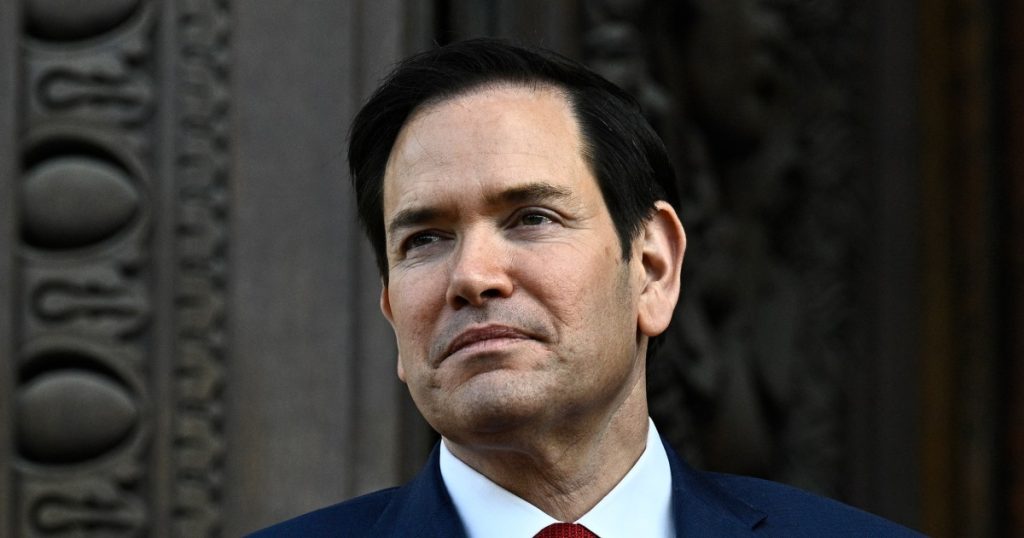Marco Rubio was just two weeks into his new job when he got a critical lesson in being President Donald Trump’s secretary of state. In Latin America on his first trip outside the United States since he became America’s top diplomat, three senior administration officials said, Rubio was caught off guard by two policy decisions made in Washington: drastic changes to foreign aid and Trump’s publicly backing turning the Gaza Strip into a Middle East Riviera.
Rubio was similarly blindsided by foreign policy pronouncements from top administration officials two more times over the next 10 days.
Since then, he has figured out a strategy to minimize such frustrations. First, he has adapted some of his foreign policy positions that, in the past, diverged from Trump’s. Second, he has been on a MAGA charm offensive, recently dining at a Capitol Hill restaurant popular with Trump loyalists and appearing at an event hosted by a powerful pro-Trump activist organization. And he spends as much time as he can at the White House to be close to Trump, according to four senior administration officials.
“Look, it’s a water cooler,” one of the senior administration officials said of the West Wing. “In any job, you want to be at the water cooler.”
Now, Rubio’s position in the Trump administration has significantly expanded, and it is likely to draw him closer to Trump, who announced Thursday that he also will take on the role of national security adviser. Trump said he would nominate his first national security adviser, Mike Waltz, to be U.S. ambassador to the United Nations.
Rubio will hold both positions for now, according to an administration official, and Trump isn’t ruling out keeping him in both indefinitely. No one has been secretary of state and national security adviser simultaneously since the influential Henry Kissinger 50 years ago.
Rubio also remains acting administrator of the diminished U.S. Agency for International Development, as well as acting archivist of the National Archives and Records Administration.
It’s a remarkable shift in fortunes for a secretary of state who sparred sharply with Trump in the past and who was at risk of being overshadowed by special envoys he tapped to take the lead on major global challenges. It’s also a transformation that is born out of a concerted effort by Rubio to assert himself in a sprawling national security team and to find his footing in Foggy Bottom, as well as his place in Trump’s orbit of longtime close advisers.
This account of Rubio’s first three months is based on interviews with more than a dozen senior current and former administration officials, congressional officials and other people who are close to Rubio or the White House and familiar with his tenure so far.
Before Thursday’s announcement, people close to Rubio and the White House said, he had increasingly become someone Trump relies on, more than he did in the early days of the administration. Foreign diplomats, too, have noticed the change.
A European official said that, even relative to a month ago, Rubio’s influence had grown — although with an evergreen caveat that when it comes to foreign policy, “no one speaks for Trump.”
People close to Rubio, a former member of the Senate Foreign Relations and Intelligence committees, said secretary of state has effectively been a dream job.
“I’ve never seen him happier,” the senior administration official said.
At the same time, the position has come with certain confines. Rubio and his team have, at times, felt the White House personnel office was blocking him from hiring more of his own staff members at the State Department, while national security officials who are seen as more MAGA were tapped for key roles. There also have been instances when Rubio’s team has conveyed to the National Security Council that he wasn’t always being looped in on decisions as much as he wanted.
The senior administration official didn’t directly address whether Rubio has been able to bring in the staff members he has wanted, saying, “We love the team that we have.”
Power struggles between the National Security Council and the State Department have been a fixture of many past administrations — one that could be diminished with Rubio serving in both positions. The senior administration official said Rubio and Waltz had a good relationship.
The official stressed that Rubio had no ideological disagreement with the decision to dismantle USAID. After Trump announced the idea of a Riviera in Gaza, which would involve displacing Palestinians, Rubio issued a full-throated public endorsement of the idea.
“It’s a very well-coordinated national security team,” the senior administration official said. “We’re really satisfied with the communication flow and the decision-making that happens.”
A rocky start
The Senate voted 99-0 to confirm Rubio — by far the largest margin for any of Trump’s Cabinet nominees.
But his uneven history with Trump — stemming from their, at times, bawdy exchanges of insults when they were both running for the Republican presidential nomination in 2016 — has led to a wariness from Trump’s Republican base. It’s also a different type of relationship from the ones Trump has with the other advisers he tapped for key diplomatic assignments. And in his White House, access to Trump is critical — and often pivotal when it comes to his decision-making process.

Rubio hasn’t had a designated workspace in the West Wing — though Waltz had a prime corner office on the main floor. Rubio has been ducking into an unused office to make calls when he’s at the White House, and he catches up with other officials there on the fly.
Rubio, who has privately expressed the importance of regular face time with Trump, also has become a regular at Mar-a-Lago — the estate in Florida where Trump stays most weekends — spending time there about every other week, according to a person close to Rubio.
“The way that the president works is he solicits opinions from a whole lot of folks,” this person said. “Being present, being at the table or in the Oval or the dinner table at Mar-a-Lago, is how these decisions are made.”
The presidential face time is designed to avoid scenarios like one in mid-February, when Rubio was in Europe holding meetings with his counterparts and wasn’t aware that Defense Secretary Pete Hegseth would deliver a speech so bluntly taking the idea of Ukraine’s joining NATO off the table. Hegseth’s comments sent shock waves across Europe and were seen as the Trump administration’s ceding leverage in negotiations with Russia to end the war in Ukraine before they had even begun.
A couple of days later, Rubio was again unexpectedly fielding outrage from officials in Europe after Vice President JD Vance delivered a speech in Munich sharply criticizing the continent.
People close to him said that while he was frustrated, he didn’t disagree with the sentiments Vance and Hegseth delivered.
Asked about Vance’s speech, the senior administration official said, “I think that what the vice president said in Munich is very strongly held beliefs of everybody in the administration.”
On the Hegseth speech, the official wouldn’t get into specifics of Rubio’s conversations but said Ukraine’s not joining NATO was “kind of an obvious reality.”
A State Department spokesperson took issue with the characterizations that Rubio was caught off guard.
“More fake news from people trying to derail President Trump’s agenda,” the official said. “Secretary Rubio will never apologize or hesitate to put America and Americans first.”
Winning over MAGA
Many of Trump’s core supporters know Rubio by the disparaging nickname Trump gave him in the 2016 campaign: “Little Marco.” They’ve viewed him as the kind of mainstream Republican who might seek to reshape rather than execute on Trump’s foreign policy agenda.
Since he was nominated to be secretary of state, Rubio has tried to ingratiate himself with Trump’s MAGA base and ease any suspicions about his loyalty.
This week, Raheem Kassam, a Trump loyalist and close associate of former top White House strategist Steve Bannon, posted a photo on X of Rubio at a new MAGA haunt on Capitol Hill, the restaurant Butterworth’s.
“If you’d have told me even a year ago that I’d be running the best spot on Capitol Hill and that Marco Rubio, as Secretary of State, would be a repeat guest, I’d have enquired as to the strength of marijuana you were smoking,” Kassam, an investor in Butterworth’s, wrote.
Rubio also made a point during the inauguration to attend a ball hosted by the pro-Trump group Turning Point USA, and in early April, he appeared on “Triggered,” Donald Trump Jr.’s podcast.

Since he became Trump’s secretary of state, Rubio has shifted his positions to the right on some key policies — from the war in Ukraine to U.S. aid overseas to immigration.
Those close to Rubio said any so-called transformation wasn’t an overnight phenomenon that took place once he was chosen to be secretary of state.
The senior administration official said that coming out of the 2016 election, Rubio sought to figure out, from a policy standpoint, how to connect the Republican agenda with the real experiences of people around the country.
“Almost everything that this administration stands for are positions that he has advocated for as part of that process,” the official said, pointing to his hard-line approach to China. “He’s every bit as natural a fit in the MAGA coalition as anybody.”
The person close to Rubio said he doesn’t believe he needs to prove his MAGA bona fides.
“People forget he was a tea party insurgent,” this person said, adding: “Core to his DNA is the insurgent grassroots. That’s how he came of age in national politics.”
‘We know who to blame’
Questions about the span of Rubio’s portfolio and his influence with Trump have hung over him since he became secretary of state, not least because Trump put multiple envoys in charge of the most pressing foreign policy challenges.
Steve Witkoff, a longtime Trump friend and fellow New York business mogul, is the key player in charge of his efforts to end the war in Ukraine, reach a ceasefire between Israel and Hamas and hold diplomatic talks with Iran over its nuclear program.
“I think it is clear, and certainly appears publicly, that Witkoff is basically the secretary of state at this point,” said a Rubio ally who speaks with him. “It’s just a tough spot to be in.”
A Republican senator also questioned where Rubio fits in on Ukraine talks. “He’s certainly there, but Steve Witkoff is running it big picture, particularly with the Russians,” the senator said.
The senior administration official said Rubio is heavily involved in all those matters, even if he’s not publicly described as in charge of the issue.
“He has an amazing relationship with Steve,” the official said.
Trump has picked others for leading roles on issues that would typically fall under the secretary of state’s portfolio.
Trump ally Ric Grenell has been tasked with handling North Korea, which Trump’s secretary of state in his first term, Mike Pompeo, visited as part of his key role in the two countries’ leaders’ historic meetings. Grenell also led an effort to secure the release of wrongfully detained Americans in Venezuela.
Vance also has been put in charge of some significant geopolitical challenges, including overseeing negotiations over the future ownership of TikTok. And so far, Trump’s treasury secretary, Scott Bessent, has played a key role in the administration’s approach to China, which has focused heavily on tariffs.
Such big-ticket foreign policy issues were top issues for Rubio’s recent predecessors in both parties.
The Western Hemisphere, including immigration, is one area where Rubio has a clear foothold.
During his first overseas travel as secretary to Latin America, he negotiated immigration agreements with Panama, Guatemala and El Salvador. He has also publicly led the charge on revoking the visas of international students who the administration has said are threats to U.S. national security.
“It’s something he’s felt very strongly about for a number of years,” the senior administration official said. “The secretary of health and human services can’t revoke visas, and so, to the extent this is a priority of the president’s, it’s natural that the State Department would do our consular affairs duty that we do.”
Another of Rubio’s assignments from Trump has been to secure the return of the Panama Canal to the United States. Trump called Rubio out during a joint address to Congress in March to wish him luck in his endeavor.
“Now we know who to blame if anything goes wrong,” Trump said.
Some of Rubio’s saw Trump’s calling him out at the joint address as devastating, because it’s something Trump is known to do in private to put aides on notice, a former Trump official said. The person close to Rubio viewed it differently, saying, “It was like how you would rip your best buddy if you had a global platform to do so.”


